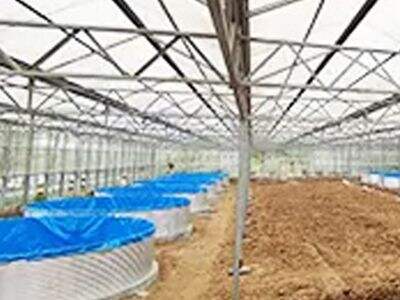Wolize is working to ensure a better future for our planet through cleaner, smarter aquafarming methods. But some of those old ways of raising fish can be harmful to the environment, we know. This means they can harm the water, plants and animals that make their home in and around our oceans, rivers and lakes. Our team is working tirelessly to produce seafood through innovative and nature-friendly methods. Our goal is to ensure that the planet is healthy and safe for future generations who will inhabit the world here.
Follow: Eco-Friendly Models For A Better Planet
One of our major objectives is to improve the sustainability of fish farming. We want to lessen the environmental impacts that these farms can have on nature. Where instead of using chemicals to treat the water in order to maintain a clean and healthy living environment for the fish, natural methods can be used instead. For instance, in the periphery of the farms, we can plant special trees, which we can refer to as mangroves. These trees assist in filtering the water and cleaning it. Also, we can use shellfish, such as oysters and mussels, as natural filters. They can help filter the water — like a sponge absorbing dirt.
These natural ways do not only reduce the pollution but also beneficial for the surroundings we have. It provides a healthier environment for fish to dwell and develop. Typical fish feed is full of other fish, which isn’t planet-friendly. This practice is detrimental to wild fish populations. Instead, we are looking into alternative forms of fish food that are more sustainable. We are exploring using bugs, beans, algae and other crops. These alternatives are cheaper, and also more sustainable. The research shows that these alternative ingredients can dramatically reduce pollution and conserve wild fish stocks.
Innovations in One of the World’s Fastest Growing Food Sources
SF: Our team is interrogating and dreaming in order to revolutionize fish farming for better environmental outcomes. One promising approach that we are experimenting with is known as recirculating aquaculture systems. By doing this, we can recycle the water used in fish farms rather than throwing it away. This is essential to prevent wasting a lot of water by recycling the water. This method also helps make the farms cleaner and keeps pollution from going into our waters.
Furthermore, we are also investigate renewable energy sources, eg solar panels and wind turbines to power the farms. This enables us to move away from the dependency of unsustainable energy sources which endanger our world by harnessing the natural energy of the sun and the wind. This allows us to lower our carbon footprint — the number of poisonous gases we emit into the atmosphere — and make the planet more habitable.
Protecting Aquatic Ecosystems
Rivers, lakes, and oceans are delicate aquatic ecosystems that are profoundly impacted by traditional fish farming methods. We think it’s absolutely crucial to safeguard these ecosystems as we implement sustainable agriculture solutions. For example, we minimize antibiotics as a part of our eco-friendly farming approach. Antibiotics are dangerous and can be toxic to fish and other aquatic species, upsetting the balance of nature.
We are also investigating approaches to ensure the health and diversity of different fish species. It is important to not allow these fish to become genetically engineered, since this can damage the natural ecosystem. We also consider how our sustainable practices impact the surrounding wildlife and ecosystems. We try to not harm the nature, we try to keep the habitat balanced and care of all living things.
Building a Brighter Future by Caring About the Environment
We continue to innovate and find better practices, but on that process, we at Wolize care to put the environment first! We put a lot of thought into the energy we consume at every stage of the fish farming process. That includes less pesticides and antibiotics, less water and less waste. We do this so we create consistency, we want to set the bar high for best practices toward sustainable seafood.
We farm fish using environmentally sustainable approaches, and we strive to become a leader in the path of sustainable fish farming as a whole. So, to conclude, our philosophy at Wolize is that sustainable aquaculture practices will help save the Earth for future generations. We are committed to released models; innovate our farming; protect aquatic ecosystems; we work for the environment. Collaboration is leading the charge for a brighter and better tomorrow for our sector and our world.













































